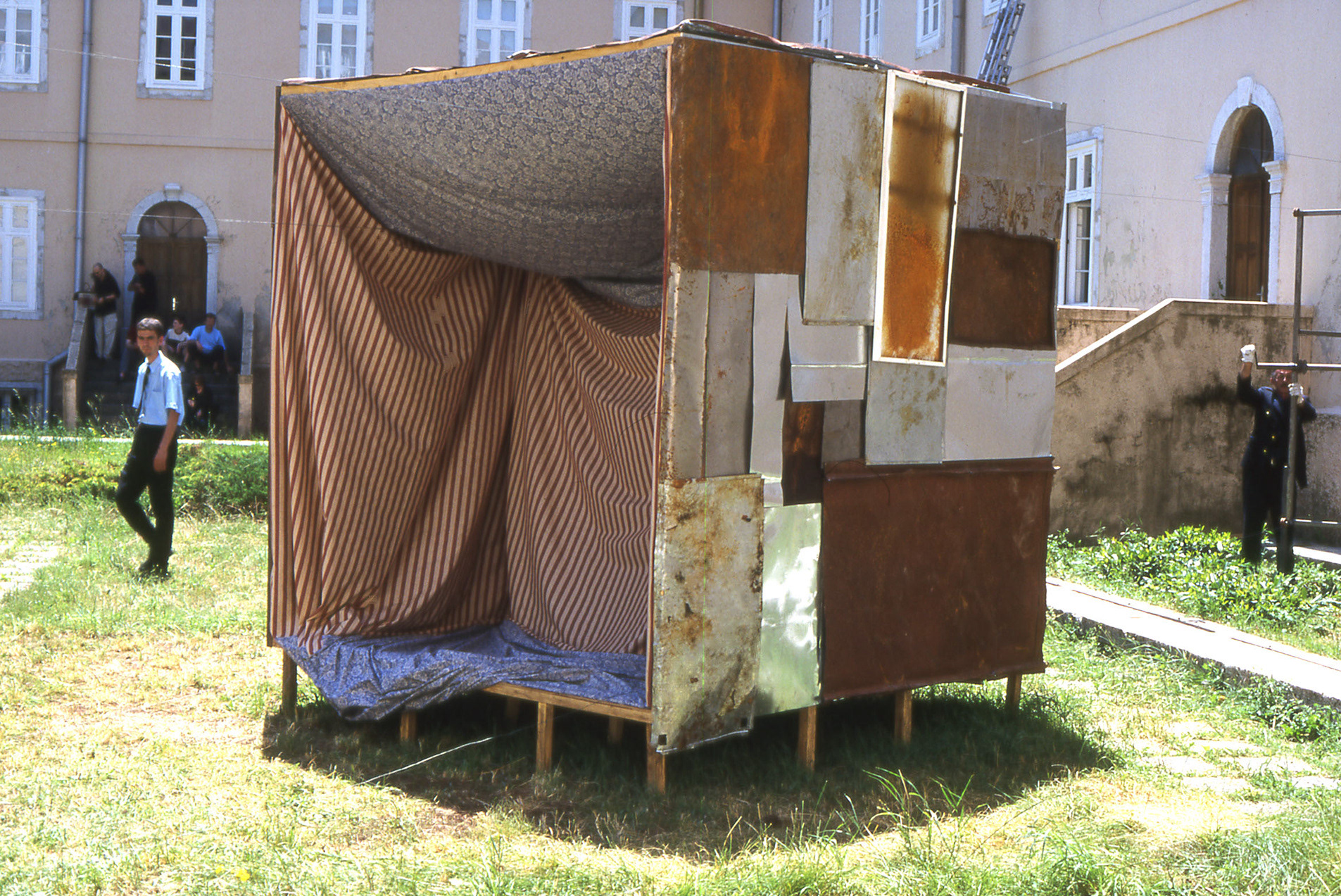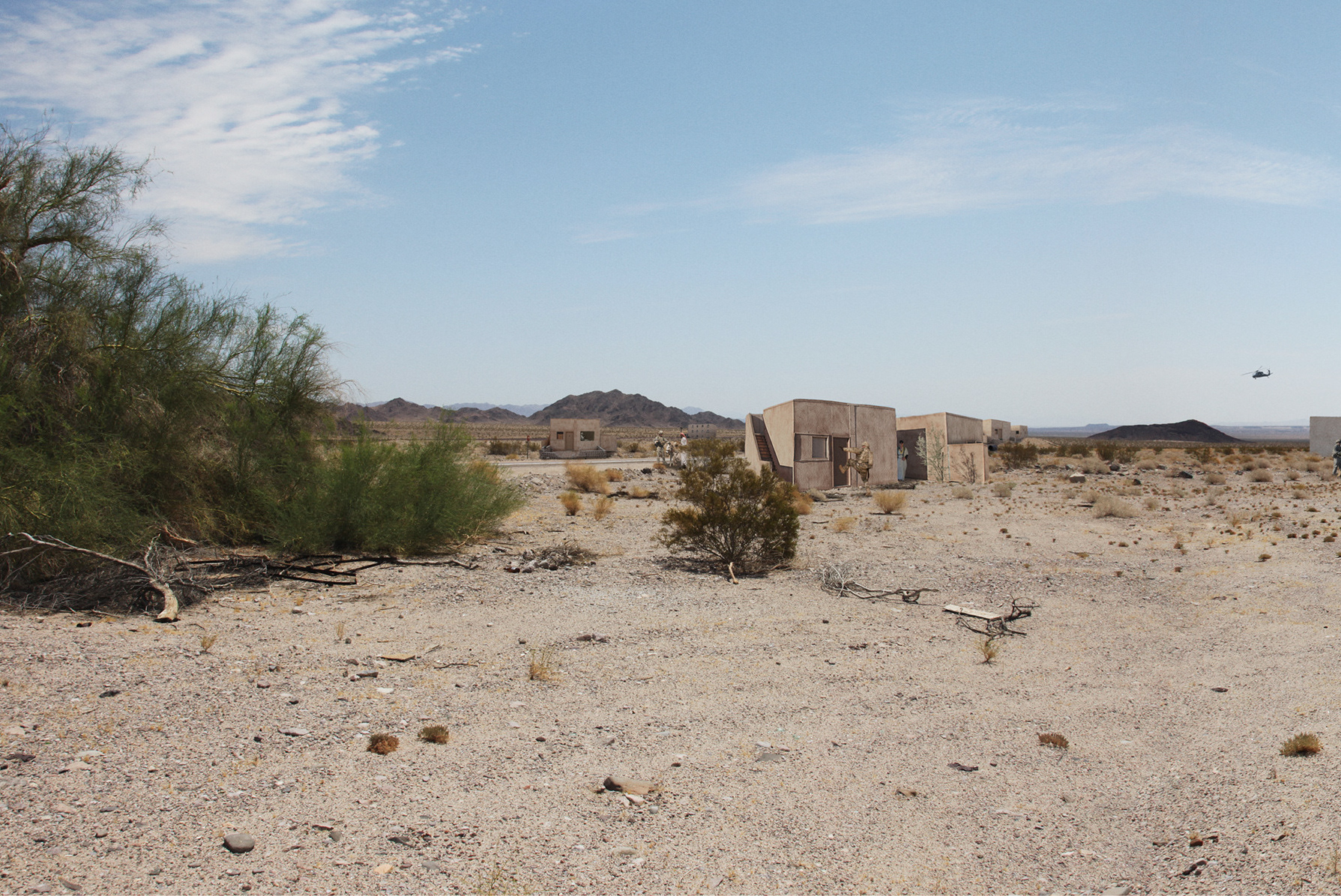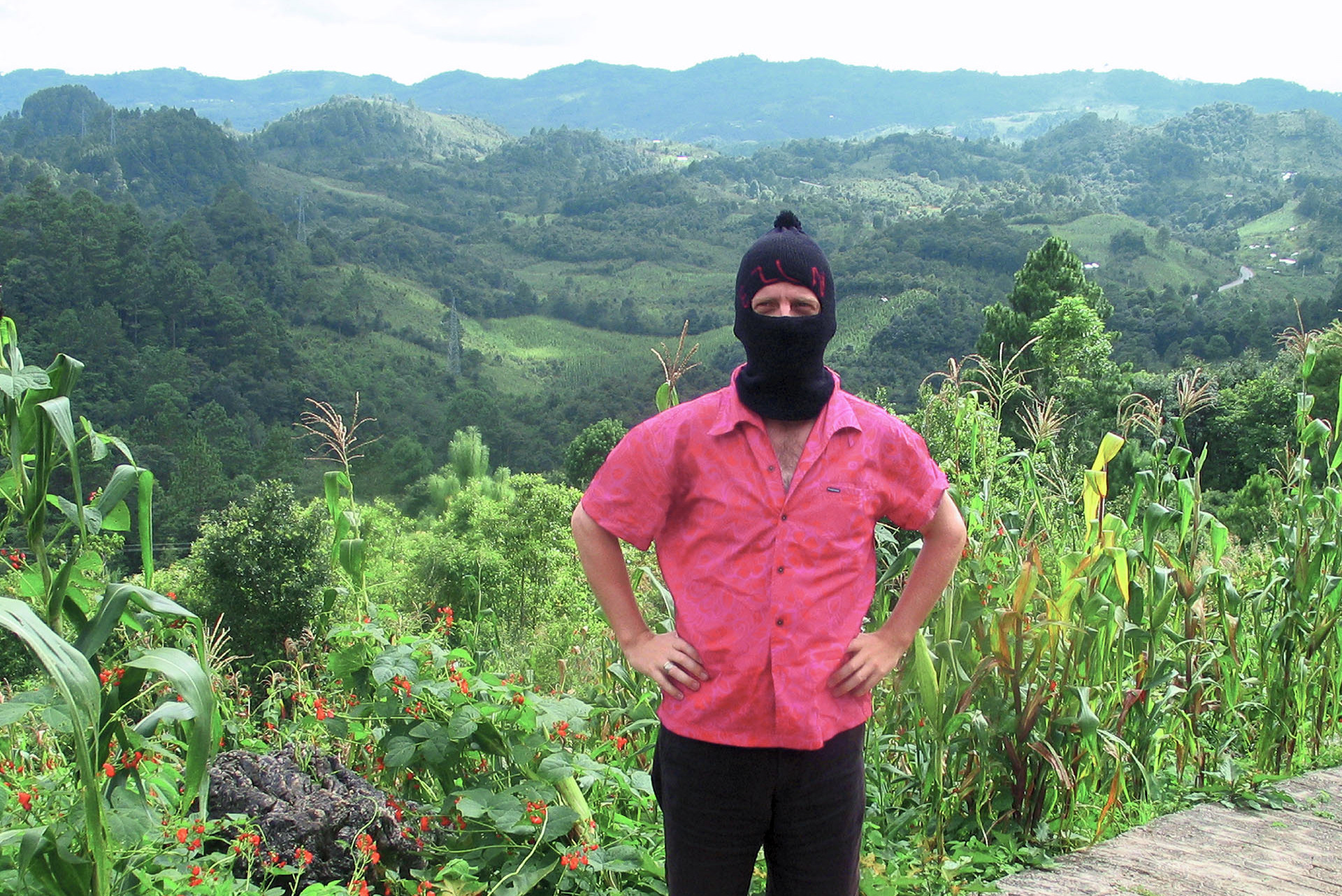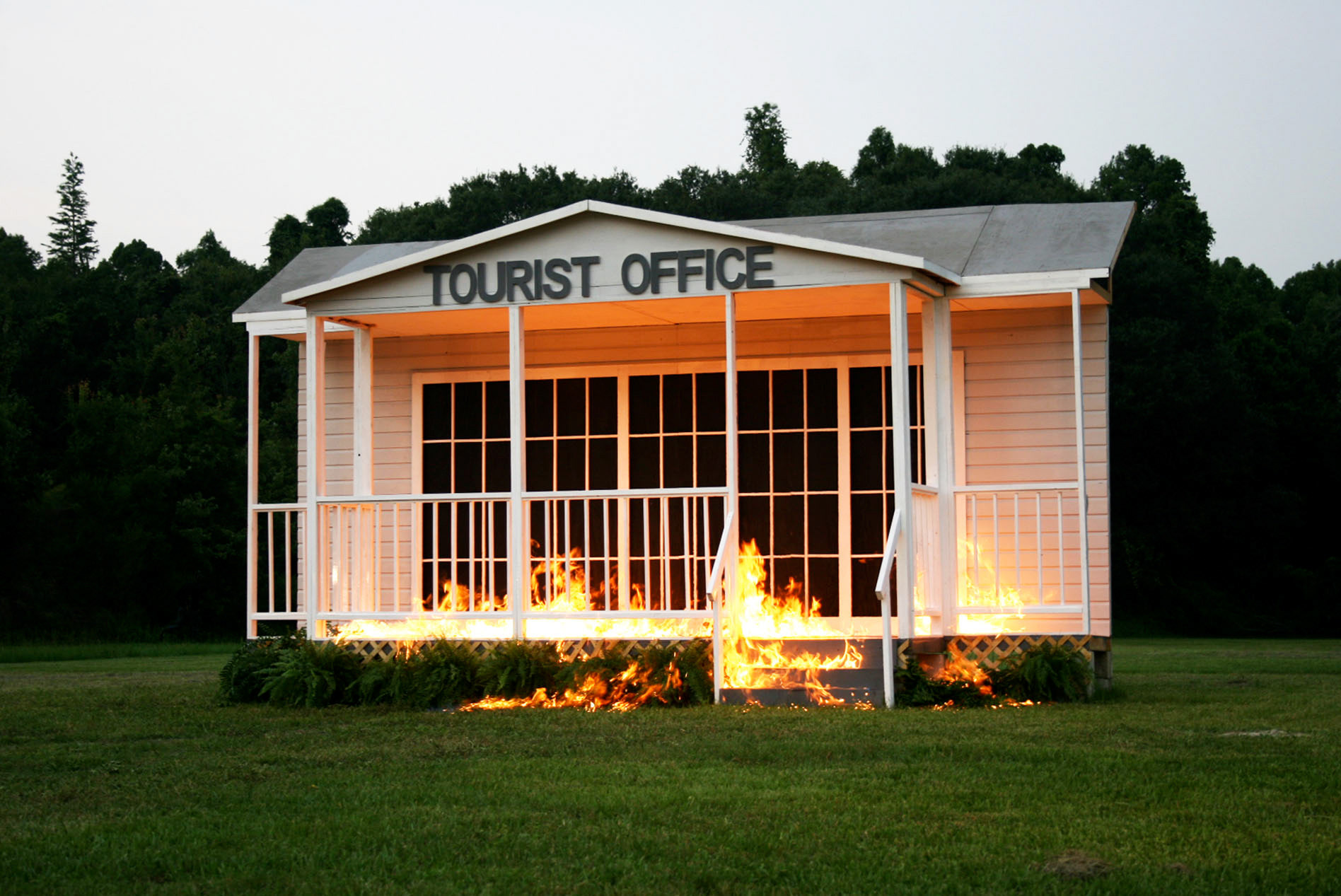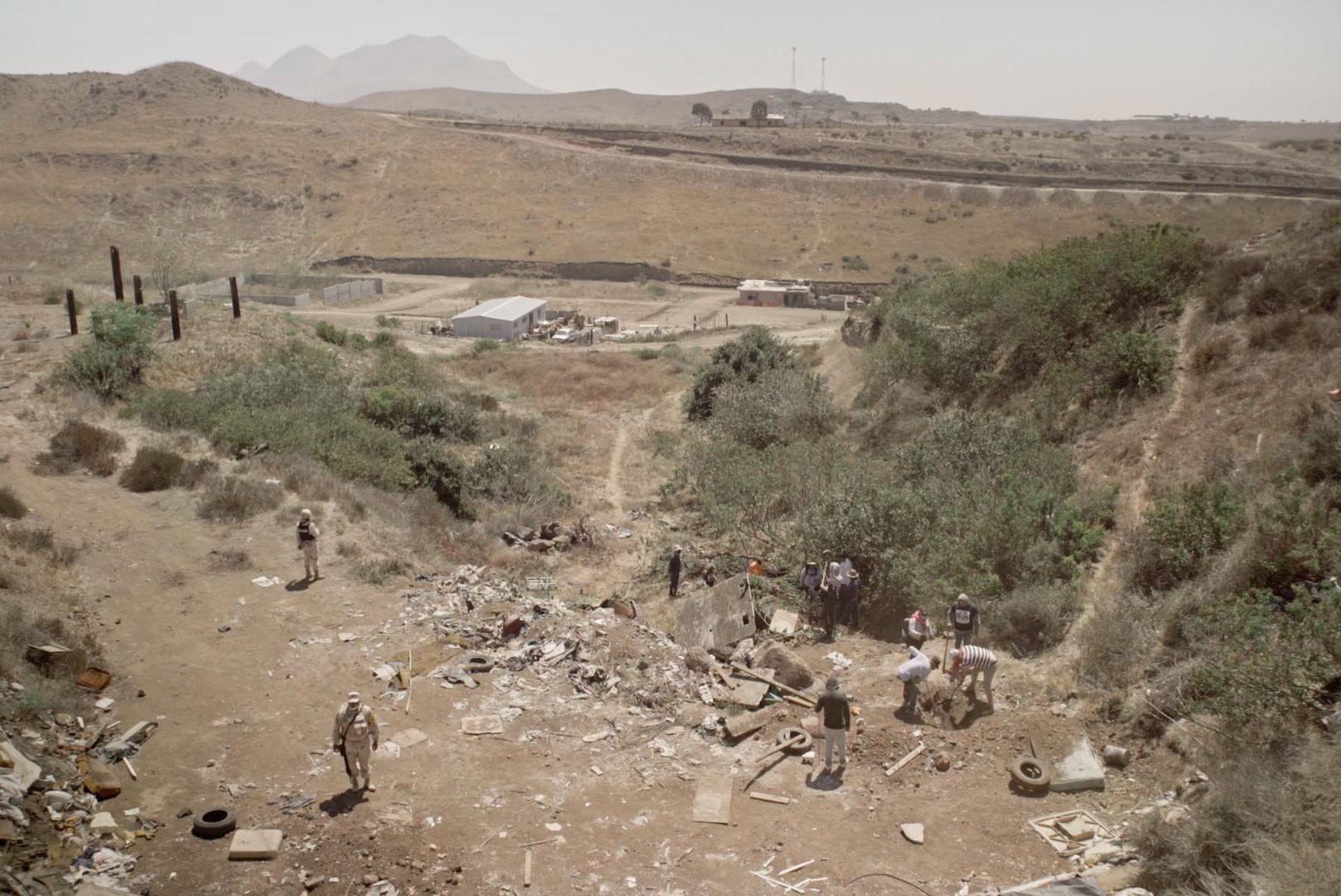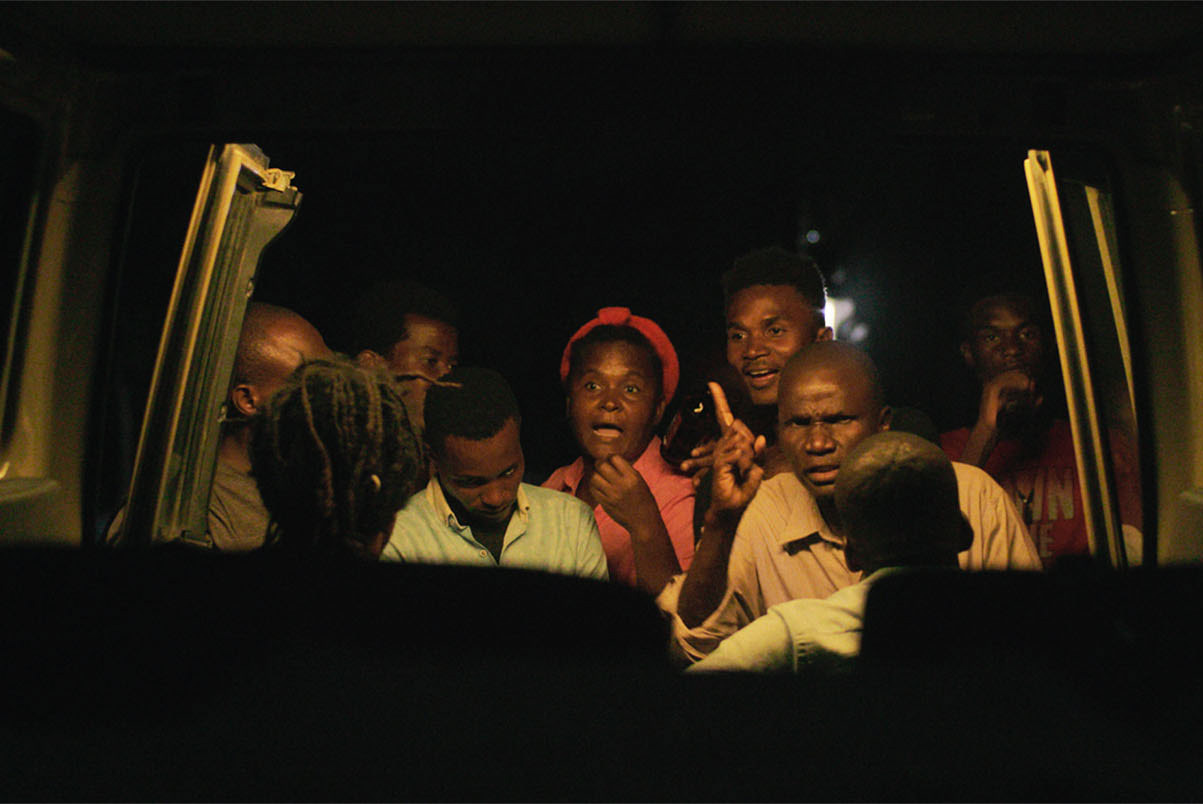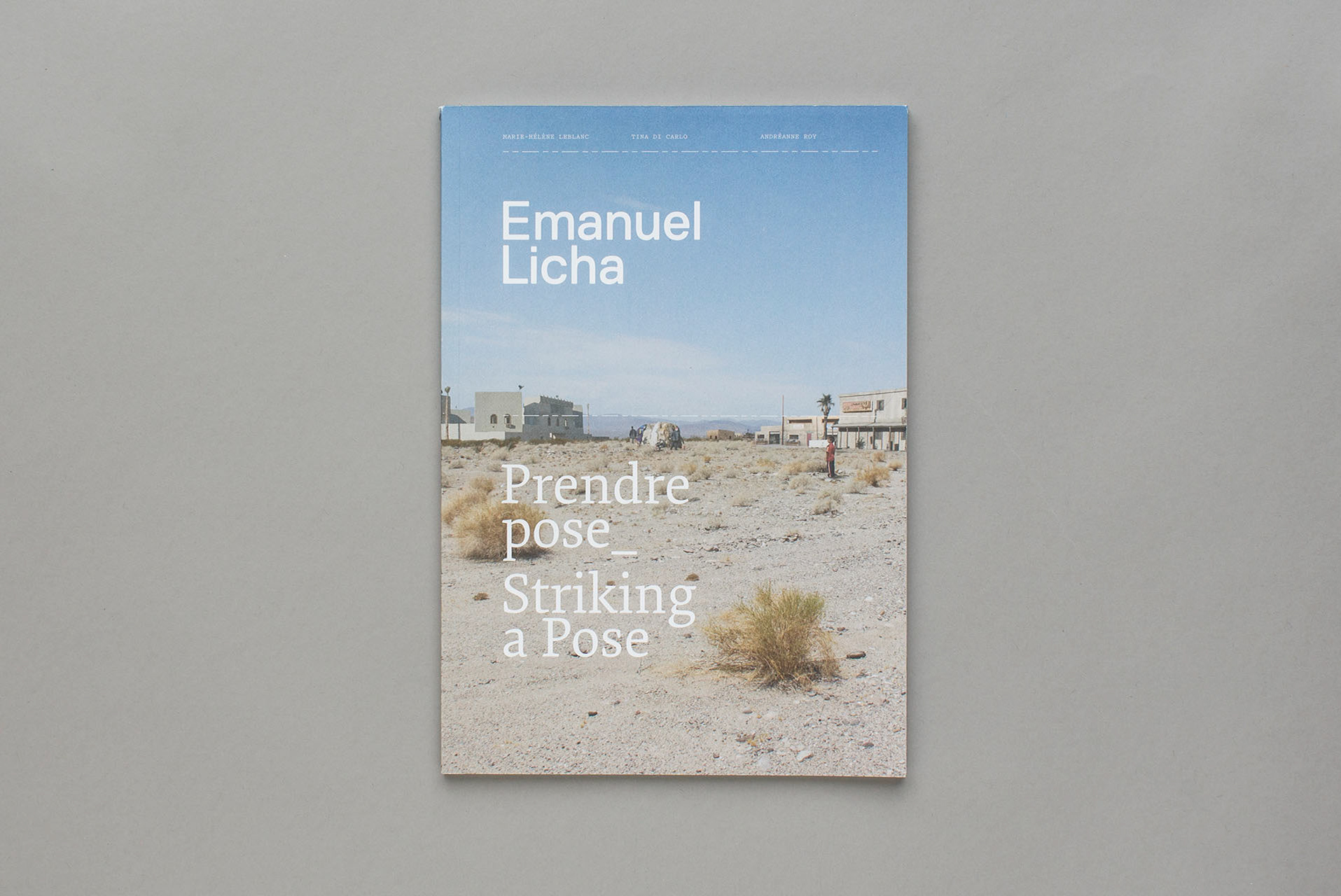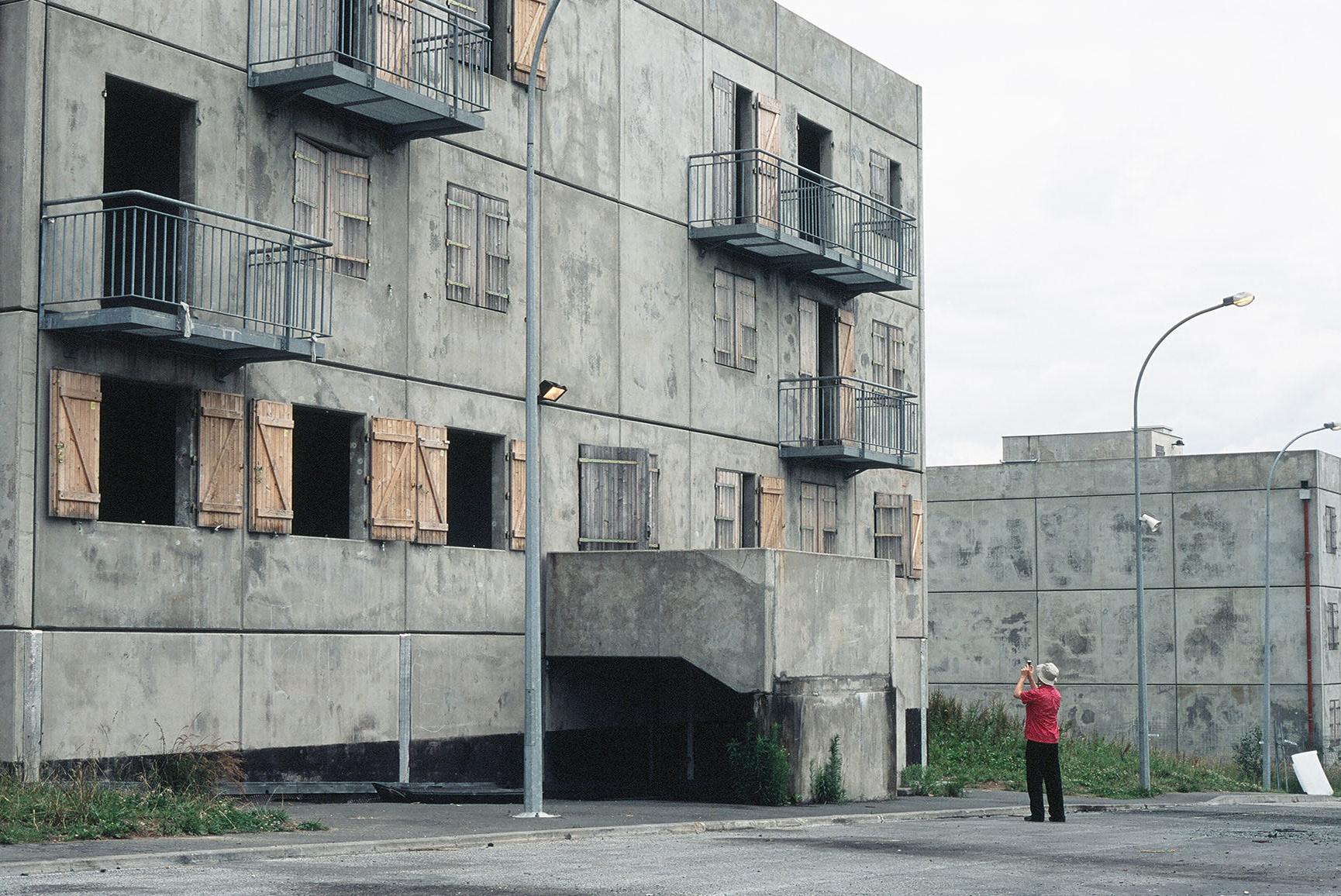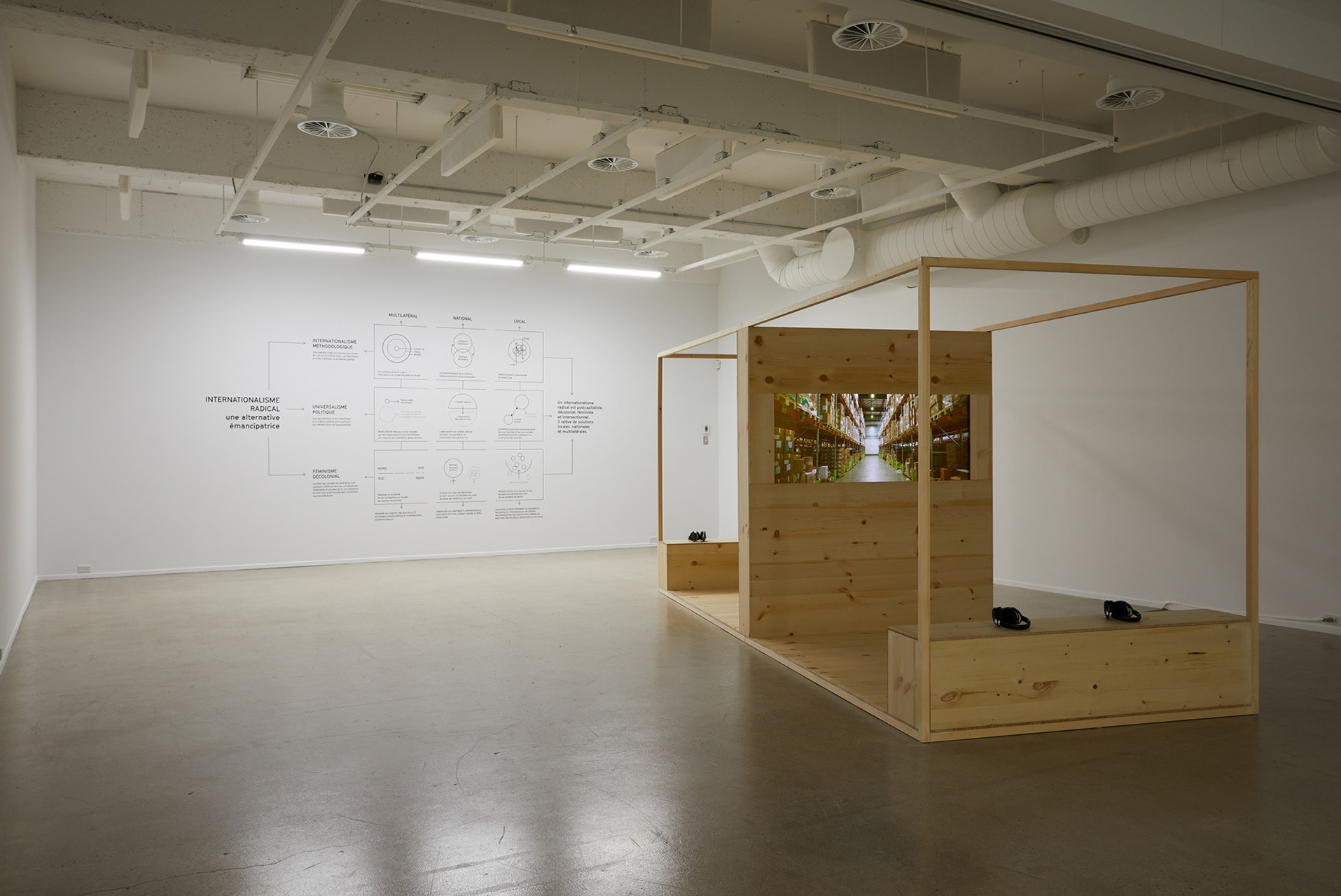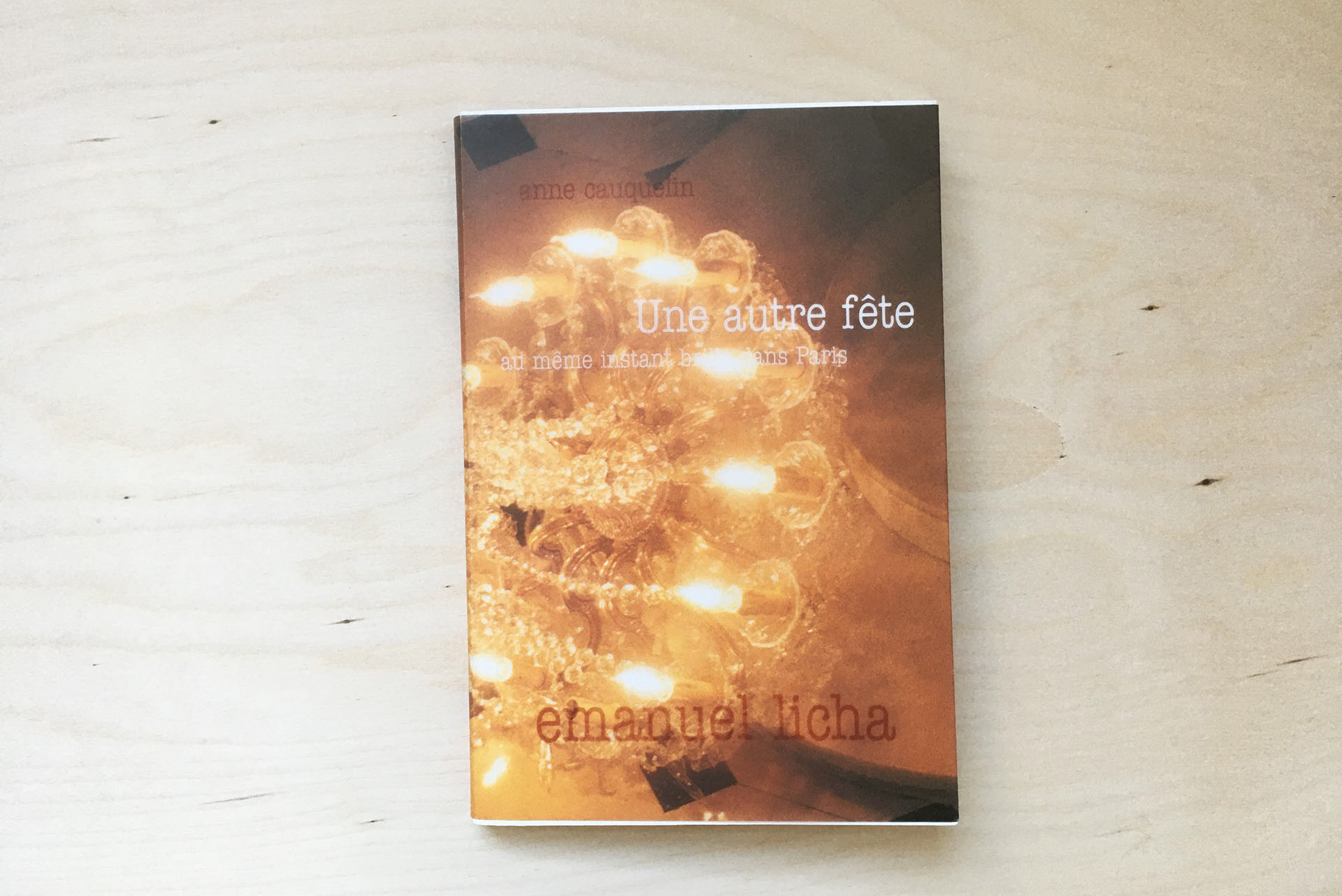Symposium
Galerie UQO, 14 October 2022
Galerie UQO, 14 October 2022
The one-day symposium, Coopérer, filmer : déconstruire la colonialité de nos regards (Cooperating, filming: deconstructing the coloniality of our gaze), provided an opportunity to explore in greater depth the themes addressed by the exhibition 4x4 - Ceci n'est pas une voiture (4x4 - This is not a car), by offering a guided tour of the exhibition, followed by two round-table discussions bringing together speakers on the issues - raised by the film, the exhibition and the publication - of radical solidarity through international cooperation, cinematographic and exhibition practices. The study day ended with a screening of the film zo reken.
While the film's device reproduces and criticizes the situation of a white gaze in a country of black people, at no point does it allow us to extricate ourselves from it. This raises the question of who benefits from documentary filmmaking in the global North, which focuses on issues in the global South. There is very often interest, curiosity about the Other and sincere solidarity in these approaches, but these qualities should not prevent us from reflecting on their agentivity and their potentially counter-productive impact.
This film device echoes the other, broader device of international cooperation in contexts of “humanitarian aid” that today continue to share many precepts with the colonial project: even back then, care and technical aid were dictated by the idea that progress had the value of a universal norm. The notion of humanitarian aid as we know it today took shape from the 1960s onwards, when a large contingent of African and Asian countries were fighting for their independence from the colonial enterprise, as if this new project were trying to take over from it.
How can we short-circuit these major trends? How can we ensure that our practices, whether as part of an artistic or international cooperation project, do not perpetuate the persistent and deliberately maintained economic and political domination of the countries of the global North over those of the global South? On the contrary, how can these practices contribute to deconstructing the coloniality of our gaze?
These were the questions addressed by the speakers at this study day, and they were reflected upon aloud in exchanges with the audience.
Credits
Organizer and speaker: Emanuel Licha
Director of Galerie UQO: Marie-Hélène Leblanc
Director of Galerie UQO: Marie-Hélène Leblanc
Speakers
Edith Brunette
Artist, author and researcher, she is interested in the discourses that make and break power, and in our modes of political engagement - particularly in the field of art. Cultivating collective forms of practice, her recent projects have focused on our relationship to territory, entrepreneurial ethos and speaking out in times of social crisis. They have been presented in numerous galleries and art centers in Canada, the Netherlands, Japan and Greece. Co-founder of the activist organization Journée sans culture, she has co-edited various publications at the intersection of art and politics (Aller à, faire avec, passer pareil, 2021; Troubler la fête, rallumer la joie!, 2016; Le Merle, 2017 and 2015), in addition to contributing as an author to various journals, books and academic publications. She is a doctoral student in political studies at the University of Ottawa, where she is conducting research on conceptions of freedom and political engagement among Canadian artists. She is the recipient of a scholarship from the Pierre Elliott Trudeau Foundation. www.edithbrunette.net
Artist, author and researcher, she is interested in the discourses that make and break power, and in our modes of political engagement - particularly in the field of art. Cultivating collective forms of practice, her recent projects have focused on our relationship to territory, entrepreneurial ethos and speaking out in times of social crisis. They have been presented in numerous galleries and art centers in Canada, the Netherlands, Japan and Greece. Co-founder of the activist organization Journée sans culture, she has co-edited various publications at the intersection of art and politics (Aller à, faire avec, passer pareil, 2021; Troubler la fête, rallumer la joie!, 2016; Le Merle, 2017 and 2015), in addition to contributing as an author to various journals, books and academic publications. She is a doctoral student in political studies at the University of Ottawa, where she is conducting research on conceptions of freedom and political engagement among Canadian artists. She is the recipient of a scholarship from the Pierre Elliott Trudeau Foundation. www.edithbrunette.net
Rodeney Cirius
Doctoral student in sociology at the Université de Montréal and professor at the Université d'État d'Haïti. His current thesis, under the supervision of Professor Yanick Noiseux, focuses on the relationship between informal work and the fight against poverty in the neoliberal era in Haiti. A member of GIREPS (Groupe de Recherche Interuniversitaire et Interdisciplinaire sur l'Emploi, la Pauvreté et la Protection Sociale), her main areas of research are: the sociology of work, the sociology of poverty, the sociology of development, social policies, employment policies, informal work and the fight against poverty in Haiti, underdevelopment, social inequalities, the intellectual history of liberalism, neoliberalism.
Doctoral student in sociology at the Université de Montréal and professor at the Université d'État d'Haïti. His current thesis, under the supervision of Professor Yanick Noiseux, focuses on the relationship between informal work and the fight against poverty in the neoliberal era in Haiti. A member of GIREPS (Groupe de Recherche Interuniversitaire et Interdisciplinaire sur l'Emploi, la Pauvreté et la Protection Sociale), her main areas of research are: the sociology of work, the sociology of poverty, the sociology of development, social policies, employment policies, informal work and the fight against poverty in Haiti, underdevelopment, social inequalities, the intellectual history of liberalism, neoliberalism.
Célia Romulus
Assistant professor at the University of Ottawa's Institute of Feminist and Gender Studies and School of International Development and Globalization. Her research and teaching are inspired by anti-oppression and anti-racist education, Afrofeminism and decolonial feminism. They explore issues related to gender and the politics of memory, migration, citizenship, political violence and interdisciplinary methods. Prior to completing her PhD, Celia Romulus worked as a program manager in the areas of gender-based violence in public spaces and security sector reform for UN Women, the UN entity dedicated to gender equality and women's empowerment. She continues to work as a consultant and trainer on issues relating to anti-oppression, anti-racism, black femininities/masculinities and gender mainstreaming in public policy and development.
Assistant professor at the University of Ottawa's Institute of Feminist and Gender Studies and School of International Development and Globalization. Her research and teaching are inspired by anti-oppression and anti-racist education, Afrofeminism and decolonial feminism. They explore issues related to gender and the politics of memory, migration, citizenship, political violence and interdisciplinary methods. Prior to completing her PhD, Celia Romulus worked as a program manager in the areas of gender-based violence in public spaces and security sector reform for UN Women, the UN entity dedicated to gender equality and women's empowerment. She continues to work as a consultant and trainer on issues relating to anti-oppression, anti-racism, black femininities/masculinities and gender mainstreaming in public policy and development.
Maïka Sondarjee
Professor of international development and globalization at the University of Ottawa. Her first essay, Perdre le Sud (2020), develops a decolonial, feminist and post-capitalist perspective on international relations. She also published a collective work in 2022 entitled Perspectives féministes en relations internationales. She won the Social Sciences and Humanities Research Council's Impact Prize in 2021 and the Royal Society of Canada's Alice Wilson Prize in 2020. She sits on the boards of the non-governmental organization Alternatives and the Canadian Association for the Study of International Development, and is active in the cause of social justice.
Professor of international development and globalization at the University of Ottawa. Her first essay, Perdre le Sud (2020), develops a decolonial, feminist and post-capitalist perspective on international relations. She also published a collective work in 2022 entitled Perspectives féministes en relations internationales. She won the Social Sciences and Humanities Research Council's Impact Prize in 2021 and the Royal Society of Canada's Alice Wilson Prize in 2020. She sits on the boards of the non-governmental organization Alternatives and the Canadian Association for the Study of International Development, and is active in the cause of social justice.
Olivia Umurerwa Rutazibwa
Belgian and Rwandan international relations researcher and former journalist. She is Assistant Professor of Human Rights and Politics in the Department of Sociology at the London School of Economics and Political Science, UK, and Senior Research Fellow at the Johannesburg Institute of Advanced Studies, South Africa. She has published in various academic journals and is the co-editor of The Routledge Handbook of Postcolonial Politics (with Robbie Shilliam, 2018) and Decolonization and Feminisms in Global Teaching and Learning (with Sara de Jong and Rosalba Icaza, Routledge, 2018). She is associate editor of the International Feminist Journal of Politics and recently joined the editorial boards of the International Politics Review and the Review of International Studies, as well as chairing the Global Development Section program of the International Studies Association.
Belgian and Rwandan international relations researcher and former journalist. She is Assistant Professor of Human Rights and Politics in the Department of Sociology at the London School of Economics and Political Science, UK, and Senior Research Fellow at the Johannesburg Institute of Advanced Studies, South Africa. She has published in various academic journals and is the co-editor of The Routledge Handbook of Postcolonial Politics (with Robbie Shilliam, 2018) and Decolonization and Feminisms in Global Teaching and Learning (with Sara de Jong and Rosalba Icaza, Routledge, 2018). She is associate editor of the International Feminist Journal of Politics and recently joined the editorial boards of the International Politics Review and the Review of International Studies, as well as chairing the Global Development Section program of the International Studies Association.
Project funded by the Social Sciences and Humanities Research Council of Canada's Insight program.
For additional information:
https://galerie.uqo.ca/evenements/journee-detude-cooperer-filmer-deconstruire-la-colonialite-de-nos-regards
https://galerie.uqo.ca/evenements/journee-detude-cooperer-filmer-deconstruire-la-colonialite-de-nos-regards
Journée d'étude
Galerie UQO, 14 octobre 2022
Galerie UQO, 14 octobre 2022
La journée d’étude Coopérer, filmer : déconstruire la colonialité de nos regards a été l’occasion d’approfondir les thématiques abordées par l’exposition 4x4 – Ceci n’est pas une voiture en proposant une visite commentée de celle-ci, suivie de deux tables rondes réunissant des intervenant·es autour des questions - soulevées par le film, l’exposition et la publication – d’une solidarité radicale portée par la coopération internationale, les pratiques cinématographiques ou d’exposition. La journée d'étude s'est terminée avec la projection du film zo reken.
Si le dispositif du film zo reke reproduit pour la critiquer la situation d’un regard blanc dans un pays de Noir·es, il ne permet à aucun moment de s’en extraire. On peut ainsi se questionner à savoir à qui profite la production cinématographique documentaire du Nord global s’intéressant à des problématiques du Sud global. Il y a très souvent de l’intérêt, de la curiosité pour l’Autre et une solidarité sincère dans ces démarches, mais ces qualités ne devraient pas nous empêcher de réfléchir à leur agentivité et à leur impact potentiellement contre-productif.
Ce dispositif du film fait écho à l’autre dispositif, plus vaste, de la coopération internationale dans des contextes d’« aide humanitaire » qui continuent aujourd’hui de partager de nombreux préceptes avec le projet colonial : déjà à l’époque, les soins et l’aide technique étaient dictés par l’idée que le progrès avait une valeur de norme universelle. La notion d’aide humanitaire telle qu’on la connaît aujourd’hui s’est ensuite précisée à partir des années 1960, au moment où un fort contingent de pays africains et asiatiques luttaient pour leur indépendance afin de se désolidariser de l’entreprise coloniale, un peu comme si ce nouveau projet tentait d’en prendre le relais.
Comment court-circuiter ces tendances lourdes? Comment faire pour que nos pratiques, qu’elles s’inscrivent dans un projet artistique ou de coopération internationale, ne perpétuent pas la domination économique et politique, persistante et volontairement entretenue, des pays du Nord global sur ceux du Sud global? Comment ces pratiques, au contraire, peuvent-elles contribuer à déconstruire la colonialité de nos regards?
C’est sur ces questions que se sont penché.es les intervenant·es de cette journée d’étude, pour les réfléchir à voix haute dans des échanges avec le public présent.
Si le dispositif du film zo reke reproduit pour la critiquer la situation d’un regard blanc dans un pays de Noir·es, il ne permet à aucun moment de s’en extraire. On peut ainsi se questionner à savoir à qui profite la production cinématographique documentaire du Nord global s’intéressant à des problématiques du Sud global. Il y a très souvent de l’intérêt, de la curiosité pour l’Autre et une solidarité sincère dans ces démarches, mais ces qualités ne devraient pas nous empêcher de réfléchir à leur agentivité et à leur impact potentiellement contre-productif.
Ce dispositif du film fait écho à l’autre dispositif, plus vaste, de la coopération internationale dans des contextes d’« aide humanitaire » qui continuent aujourd’hui de partager de nombreux préceptes avec le projet colonial : déjà à l’époque, les soins et l’aide technique étaient dictés par l’idée que le progrès avait une valeur de norme universelle. La notion d’aide humanitaire telle qu’on la connaît aujourd’hui s’est ensuite précisée à partir des années 1960, au moment où un fort contingent de pays africains et asiatiques luttaient pour leur indépendance afin de se désolidariser de l’entreprise coloniale, un peu comme si ce nouveau projet tentait d’en prendre le relais.
Comment court-circuiter ces tendances lourdes? Comment faire pour que nos pratiques, qu’elles s’inscrivent dans un projet artistique ou de coopération internationale, ne perpétuent pas la domination économique et politique, persistante et volontairement entretenue, des pays du Nord global sur ceux du Sud global? Comment ces pratiques, au contraire, peuvent-elles contribuer à déconstruire la colonialité de nos regards?
C’est sur ces questions que se sont penché.es les intervenant·es de cette journée d’étude, pour les réfléchir à voix haute dans des échanges avec le public présent.
Crédits
Organisateur et intervenant: Emanuel Licha
Directrice de la Galerie UQO: Marie-Hélène Leblanc
Directrice de la Galerie UQO: Marie-Hélène Leblanc
Intervenant.es:
Edith Brunette
Artiste, autrice et chercheuse, elle s’intéresse aux discours qui font et défont les pouvoirs, ainsi qu’à nos modes d’engagement politique – en particulier dans le champ de l’art. Cultivant des formes collectives de pratiques, ses projets récents ont notamment porté sur nos relations au territoire, l’ethos entrepreneuriale et la prise de parole en période de crise sociale. Ils ont été présentés dans de nombreuses galeries et centres d’art au Canada, aux Pays-Bas, au Japon et en Grèce. Cofondatrice de l’organisation militante Journée sans culture, elle a coédité diverses publications à l’intersection de l’art et du politique (Aller à, faire avec, passer pareil, 2021; Troubler la fête, rallumer la joie!, 2016; Le Merle, 2017 et 2015), en plus de contribuer comme autrice à différentes revues, livres et publications universitaires. Elle est doctorante en études politiques à l’Université d’Ottawa, où elle mène une recherche sur les conceptions de la liberté et l’engagement politique des artistes canadien·nes. Elle est récipiendaire d’une bourse d’études de la Fondation Pierre-Elliott Trudeau. www.edithbrunette.net
Rodeney Cirius
Doctorant en sociologie à l’Université de Montréal et professeur à l’Université d’État d’Haïti. Sa thèse en cours sous la direction du professeur Yanick Noiseux porte sur le rapport entre le travail informel et la lutte contre la pauvreté à l’ère du néolibéralisme en Haïti. Membre du GIREPS (Groupe de Recherche Interuniversitaire et Interdisciplinaire sur l’Emploi, la Pauvreté et la Protection Sociale), ses principaux domaines de recherche sont : la sociologie du travail, la sociologie de la pauvreté, la sociologie du développement, les politiques sociales, les politiques d’emploi, le travail informel et la lutte contre la pauvreté en Haïti, le sous-développement, les inégalités sociales, l’histoire intellectuelle du libéralisme, le néolibéralisme.
Célia Romulus
Professeure adjointe à l’Institut d’Études Féministes et de Genre et à l’École de Développement International et Mondialisation de l’Université d’Ottawa. Sa recherche et son enseignement s’inspirent de l’éducation anti-oppression et antiraciste ainsi que des afroféminismes et du féminisme décolonial. Ils explorent des questions liées au genre et à la politique de la mémoire, aux migrations, à la citoyenneté, à la violence politique et aux méthodes interdisciplinaires. Avant de terminer son doctorat, Célia Romulus a travaillé comme directrice de programme dans les domaines de la violence sexiste dans les espaces publics et de la réforme du secteur de la sécurité pour ONU Femmes, l’entité des Nations Unies dédiée à l’égalité des sexes et à l’autonomisation des femmes. Elle continue à travailler en tant que consultante et formatrice sur des questions liées à l’anti-oppression, l’antiracisme, les féminités/masculinités noires et l’intégration du genre dans les politiques publiques et dans le développement.
Maïka Sondarjee
Professeure en développement international et mondialisation à l’Université d’Ottawa. Son premier essai, Perdre le Sud (2020), développe une perspective décoloniale, féministe et post-capitaliste des relations internationales. Elle a également publié un ouvrage collectif en 2022 intitulé Perspectives féministes en relations internationales. Elle a gagné le Prix Impact du Conseil de recherches en sciences humaines en 2021 et le Prix Alice Wilson de la Société Royale du Canada en 2020. Elle siège aux conseils d'administration de l'organisation non-gouvernementale Alternatives et de l’Association canadienne d’études du développement international, et elle s’implique pour plus de justice sociale.
Olivia Umurerwa Rutazibwa
Chercheuse belge et rwandaise spécialiste des relations internationales et une ancienne journaliste. Elle est professeure adjointe en droits de la personne et en politique au département de sociologie de la London School of Economics and Political Science, au Royaume-Uni, et chercheuse principale au Johannesburg Institute of Advanced Studies, en Afrique du Sud. Elle a publié dans diverses revues universitaires et est la coéditrice de The Routledge Handbook of Postcolonial Politics (avec Robbie Shilliam, 2018) et de Decolonization and Feminisms in Global Teaching and Learning (avec Sara de Jong et Rosalba Icaza, Routledge, 2018). Elle est rédactrice adjointe de l'International Feminist Journal of Politics et a récemment rejoint les comités de rédaction de l'International Politics Review et de la Review of International Studies, ainsi que la présidence du programme Global Development Section of the International Studies Association.
Artiste, autrice et chercheuse, elle s’intéresse aux discours qui font et défont les pouvoirs, ainsi qu’à nos modes d’engagement politique – en particulier dans le champ de l’art. Cultivant des formes collectives de pratiques, ses projets récents ont notamment porté sur nos relations au territoire, l’ethos entrepreneuriale et la prise de parole en période de crise sociale. Ils ont été présentés dans de nombreuses galeries et centres d’art au Canada, aux Pays-Bas, au Japon et en Grèce. Cofondatrice de l’organisation militante Journée sans culture, elle a coédité diverses publications à l’intersection de l’art et du politique (Aller à, faire avec, passer pareil, 2021; Troubler la fête, rallumer la joie!, 2016; Le Merle, 2017 et 2015), en plus de contribuer comme autrice à différentes revues, livres et publications universitaires. Elle est doctorante en études politiques à l’Université d’Ottawa, où elle mène une recherche sur les conceptions de la liberté et l’engagement politique des artistes canadien·nes. Elle est récipiendaire d’une bourse d’études de la Fondation Pierre-Elliott Trudeau. www.edithbrunette.net
Rodeney Cirius
Doctorant en sociologie à l’Université de Montréal et professeur à l’Université d’État d’Haïti. Sa thèse en cours sous la direction du professeur Yanick Noiseux porte sur le rapport entre le travail informel et la lutte contre la pauvreté à l’ère du néolibéralisme en Haïti. Membre du GIREPS (Groupe de Recherche Interuniversitaire et Interdisciplinaire sur l’Emploi, la Pauvreté et la Protection Sociale), ses principaux domaines de recherche sont : la sociologie du travail, la sociologie de la pauvreté, la sociologie du développement, les politiques sociales, les politiques d’emploi, le travail informel et la lutte contre la pauvreté en Haïti, le sous-développement, les inégalités sociales, l’histoire intellectuelle du libéralisme, le néolibéralisme.
Célia Romulus
Professeure adjointe à l’Institut d’Études Féministes et de Genre et à l’École de Développement International et Mondialisation de l’Université d’Ottawa. Sa recherche et son enseignement s’inspirent de l’éducation anti-oppression et antiraciste ainsi que des afroféminismes et du féminisme décolonial. Ils explorent des questions liées au genre et à la politique de la mémoire, aux migrations, à la citoyenneté, à la violence politique et aux méthodes interdisciplinaires. Avant de terminer son doctorat, Célia Romulus a travaillé comme directrice de programme dans les domaines de la violence sexiste dans les espaces publics et de la réforme du secteur de la sécurité pour ONU Femmes, l’entité des Nations Unies dédiée à l’égalité des sexes et à l’autonomisation des femmes. Elle continue à travailler en tant que consultante et formatrice sur des questions liées à l’anti-oppression, l’antiracisme, les féminités/masculinités noires et l’intégration du genre dans les politiques publiques et dans le développement.
Maïka Sondarjee
Professeure en développement international et mondialisation à l’Université d’Ottawa. Son premier essai, Perdre le Sud (2020), développe une perspective décoloniale, féministe et post-capitaliste des relations internationales. Elle a également publié un ouvrage collectif en 2022 intitulé Perspectives féministes en relations internationales. Elle a gagné le Prix Impact du Conseil de recherches en sciences humaines en 2021 et le Prix Alice Wilson de la Société Royale du Canada en 2020. Elle siège aux conseils d'administration de l'organisation non-gouvernementale Alternatives et de l’Association canadienne d’études du développement international, et elle s’implique pour plus de justice sociale.
Olivia Umurerwa Rutazibwa
Chercheuse belge et rwandaise spécialiste des relations internationales et une ancienne journaliste. Elle est professeure adjointe en droits de la personne et en politique au département de sociologie de la London School of Economics and Political Science, au Royaume-Uni, et chercheuse principale au Johannesburg Institute of Advanced Studies, en Afrique du Sud. Elle a publié dans diverses revues universitaires et est la coéditrice de The Routledge Handbook of Postcolonial Politics (avec Robbie Shilliam, 2018) et de Decolonization and Feminisms in Global Teaching and Learning (avec Sara de Jong et Rosalba Icaza, Routledge, 2018). Elle est rédactrice adjointe de l'International Feminist Journal of Politics et a récemment rejoint les comités de rédaction de l'International Politics Review et de la Review of International Studies, ainsi que la présidence du programme Global Development Section of the International Studies Association.
Projet financé par le programme Savoir du Conseil de recherches en sciences humaines du Canada.
Voir tout le programme sur le site de la Galerie UQO:
https://galerie.uqo.ca/evenements/journee-detude-cooperer-filmer-deconstruire-la-colonialite-de-nos-regards
https://galerie.uqo.ca/evenements/journee-detude-cooperer-filmer-deconstruire-la-colonialite-de-nos-regards
